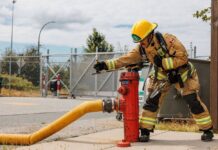VANCOUVER Fire Rescue Services on Monday showcased its new electric fire engine: an agile, responsive, safe and climate-friendly emergency response vehicle with health benefits for frontline firefighters.
The Rosenbauer RTX Pumper Truck is now operating out of Firehall No. 1 in Strathcona and supports the City’s commitment to reduce fleet emissions by transitioning to electric vehicles when replaced.
“This state-of-the-art electric fire engine represents an important milestone in our efforts to reduce carbon emissions from our fleet,” said Vancouver Mayor Ken Sim. “We are extremely proud to be the first in Canada to deploy an electric fire engine and lead the way with this exciting addition to Vancouver’s firefighting fleet.”

“The new electric fire engine demonstrates innovation, safety, health and responsive service delivery can all be prioritized,” said Karen Fry, Fire Chief and General Manager of Vancouver Fire Rescue Services. “This is a highly sophisticated piece of equipment that will enhance our capability to protect people and property, and substantially improve the health and safety of firefighters.”
The Austrian-built Rosenbauer RTX Pumper Truck offers several improvements over traditional fire engines, including:
- Agility: Its narrower and shorter design enables unparalleled maneuverability, enhancing responsiveness during emergencies.
- Noise reduction: The electric engine minimizes operational noise, making it easier for crews to work, improving communication, lowering stress and benefiting nearby residents.
- Versatility: The open cab design allows the fire engine to serve as a rehab area or command center.
- Accessibility: Adjustable suspension facilitates easier entry and exit, offering lower cab heights and better access to heavy equipment.
- Health benefits: The electric engine significantly reduces firefighters’ exposure to carcinogens and pollutants from diesel exhaust.
The deployment of the electric Rosenbrauer RTX fire engine aligns with the City of Vancouver’s climate targets of reducing carbon pollution and becoming more resilient to fluctuating oil and gas prices. The City has committed to reduce fleet emissions by 60 per cent below 2007 levels by 2030. Currently, 10 per cent of the City’s fleet vehicles are electric and the percentage will continue to increase as aging diesel and gas-powered vehicles are replaced.
Learn more: Climate Emergency Action Plan













